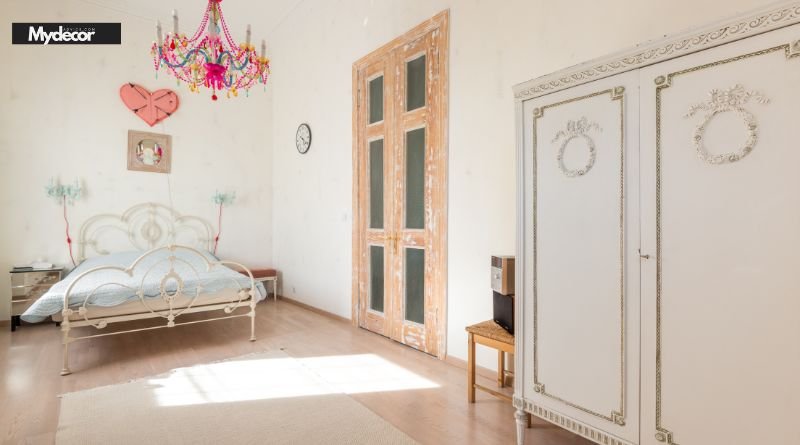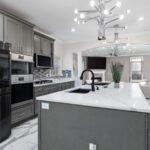When it comes to designing and organizing a bedroom, the closet plays a significant role in both functionality and aesthetics. Bedroom closet doors are not only practical but also contribute to the overall look and feel of the room. From sliding doors to bi-fold doors, the variety of options can make it challenging to choose the best one for your space. In this article, we will explore different types of bedroom closet doors, their benefits, and how to select the right one to enhance both the style and functionality of your room.
Understanding the Importance of Bedroom Closet Doors
Bedroom closet doors are more than just barriers that separate the inside of your closet from the rest of the room. They serve to hide clutter, maintain privacy, and help organize your clothing and accessories. The style and functionality of the closet door can either complement or clash with the existing interior design of the room. For example, a sleek and modern sliding door may work well in a minimalist room, while a traditional panel door could be perfect for a more classic or rustic space.
Additionally, the choice of bedroom closet doors can also impact how you utilize the space inside the closet. Some doors allow for more accessible storage options, while others might limit the available space due to their design. Understanding the different types of closet doors and their pros and cons can help you make an informed decision that suits both your aesthetic and practical needs.
Types of Bedroom Closet Doors
There are several types of bedroom closet doors to choose from, each with its own unique characteristics and advantages. Below are some of the most popular options available:
1. Sliding Closet Doors
Sliding closet doors are one of the most popular choices for modern homes. These doors slide horizontally along a track, making them ideal for small spaces where swinging doors might be cumbersome. Sliding doors are available in various materials, including wood, mirrored glass, and even frosted glass, offering versatility in design.
Advantages:
- Space-saving: Sliding doors do not swing open, which means they don’t require extra space to operate. This makes them perfect for rooms with limited space or areas where you want to maximize the usable floor area.
- Contemporary appeal: Sliding doors are a sleek and modern option that can add a sophisticated touch to any bedroom. Their clean lines and minimalist design complement a range of interior styles.
- Ease of use: Sliding doors are simple to operate and provide a smooth opening and closing experience. They are also less likely to get in the way of furniture or other obstacles in the room.
Disadvantages:
- Installation complexity: Sliding doors require a track system to function properly, and the installation can be more complicated than other types of doors. This might involve additional costs for professional installation.
- Limited access: Since the doors only open halfway at a time, accessing the closet can be a bit more challenging, especially if you have a larger closet or need to reach items stored at the back.
2. Bi-Fold Closet Doors
Bi-fold closet doors are another great option for bedroom closets. These doors fold in half as they open, allowing them to take up less space than traditional hinged doors. Bi-fold doors are often made of lightweight materials, including wood or composite panels, and can be customized to fit the style of your room.
Advantages:
- Compact design: Bi-fold doors are perfect for rooms with tight spaces. When opened, the doors fold neatly to the side, so they don’t require much clearance, making them a great option for smaller bedrooms or closets.
- Traditional and stylish: Bi-fold doors can be made with elegant wood finishes or frosted glass, offering a classic look that complements various interior themes, from traditional to contemporary.
- Easier access than sliding doors: Unlike sliding doors, bi-fold doors allow full access to the entire closet opening, making it easier to retrieve items stored in the back.
Disadvantages:
- Durability concerns: While bi-fold doors are space-efficient, their folding mechanism may wear out over time, especially if the door is used frequently. This could lead to issues with the hinges or tracks.
- Limited customization: Although bi-fold doors are available in various finishes, they may not offer as much customization in terms of design and materials as sliding doors.
3. Hinged (Swing) Closet Doors
Hinged or swing doors are the traditional closet doors that open outward, typically mounted on a set of hinges. These doors are available in a variety of materials, including wood, glass, and metal, and can be customized to suit the style of the room. Hinged doors are a popular choice for larger closets where space is not an issue.
Advantages:
- Easy access: Hinged doors provide full access to the closet, allowing you to easily view and retrieve items stored inside. This is especially useful for larger closets with a lot of clothing and accessories.
- Classic and customizable: Swing doors offer a timeless appeal and can be customized with various finishes, designs, and hardware to match the bedroom’s decor.
- Durability: Hinged doors are usually quite sturdy and durable, especially when made from solid wood or other high-quality materials.
Disadvantages:
- Space requirements: One of the main downsides of hinged doors is that they require enough space in front of the closet to open fully. In smaller rooms or areas with limited clearance, this can be problematic.
- Installation: Swing doors need to be installed with proper alignment to avoid issues with opening and closing. This can sometimes require professional help, which may add to the cost.
4. Mirror Closet Doors
Mirror closet doors are a popular choice for bedrooms, particularly in smaller spaces where maximizing functionality is key. These doors are usually made of wood or metal frames with a full-length mirror pane. Mirror doors are ideal for bedrooms where you need both closet doors and a mirror in one.
Advantages:
- Space-enhancing: Mirrors can make a room appear larger by reflecting light and creating the illusion of space. This makes them a great option for small bedrooms or apartments.
- Dual purpose: Mirror closet doors serve a dual function, providing a reflective surface while also acting as closet doors. This eliminates the need for a separate full-length mirror, saving both space and money.
- Aesthetic appeal: Mirror doors can add a modern and chic element to the bedroom, helping to create a sophisticated atmosphere.
Disadvantages:
- Maintenance: Mirrors can get dirty or smudged easily, requiring frequent cleaning to maintain their clarity and shine.
- Fragility: While mirror doors are often durable, the glass can be fragile and prone to cracking or breaking if not handled properly.
5. French Doors
French doors offer a more elegant and sophisticated look for bedroom closets. These doors typically consist of two hinged panels that open outward, often with glass inserts or decorative panels. French doors are a great option for creating a more refined, classic look in the bedroom.

Advantages:
- Elegant design: French doors add a touch of luxury and charm to any bedroom. They are perfect for traditional or vintage-inspired interiors, enhancing the room’s overall aesthetic.
- Full access: Like hinged doors, French doors provide easy access to the entire closet, making it easier to organize and access clothing and other items.
- Natural light: If the doors feature glass panels, they can allow natural light to flow into the closet, making the space feel brighter and more open.
Disadvantages:
- Space requirements: Like hinged doors, French doors need ample space to swing open. This can be an issue in smaller bedrooms or closets with limited clearance.
- Cost: French doors can be more expensive than other types of closet doors due to their detailed craftsmanship and materials.
Choosing the Right Bedroom Closet Doors
When selecting the perfect bedroom closet doors, there are several factors to consider:
- Space: The amount of available space in your bedroom and closet will influence your choice of door. If you have a small room, sliding or bi-fold doors may be more practical. On the other hand, if you have a larger room, hinged or French doors could provide a more elegant solution.
- Style and Design: Your closet doors should complement the overall decor of your bedroom. Consider the materials, colors, and finishes that will blend well with your existing furniture and design elements. For example, if you have a modern bedroom, sliding or mirror doors might be a great fit, while traditional rooms may benefit from hinged or French doors.
- Budget: The cost of closet doors can vary greatly depending on the type and materials used. Sliding doors and mirror doors can sometimes be more expensive due to the additional hardware and glass features. However, there are budget-friendly options available for every style.
- Functionality: Consider how often you will use your closet and the amount of storage you need. Sliding doors may work well in a bedroom where closet access is occasional, while hinged or bi-fold doors might be better for more frequent use.
- Installation: Some types of closet doors, like sliding or French doors, may require more complex installation processes. Be sure to factor in installation costs if you’re hiring a professional.
Conclusion
Choosing the right bedroom closet doors is essential for both the functionality and aesthetics of your space. Whether you opt for sliding, bi-fold, hinged, mirror, or French doors, each type offers its own set of benefits to suit different needs and styles. By considering the available space, desired look, and practical functionality, you can find the perfect closet door solution to enhance your bedroom and streamline your storage.








